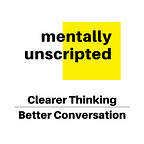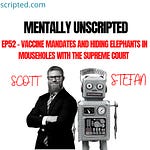In this episode of Mentally Unscripted, Paul and Scott talk about using disconfirming evidence and falsifiability to overcome confirmation bias.
Resources
Confirmation Bias: Why Your Decisions Suck and You Fight With Your Friends
Use Disconfirming Evidence to Make Your Decisions Suck Less
Judgment in Managerial Decision Making
Probabilistic Thinking
Top Takeaways
1. Humans tend to look only for confirming evidence. But often we need disconfirming evidence to find the correct solution to a question.
2. Disconfirming evidence is better to use when examining a belief because it uses deductive logic instead of inductive logic.
3. Understanding the risk posed by COVID is complicated by the lack of unfiltered, scientific data that gives a level-headed view of the situation.
Timestamps
[0:00] Discussion of Idiocracy – is it fiction or a documentary?
[4:42] What is confirming and disconfirming evidence?
[7:07] A study demonstrating the value of disconfirming evidence.
[10:56] People tend to avoid using disconfirming evidence because it takes more resources than seeking out confirming information.
[13:08] Falsifiability, the problem of induction, and deductive reasoning.
[18:03] Unfalsifiable claims may still be true. We just can’t falsify them.
[21:18] Applying disconfirming evidence and falsifiability to COVID.
[21:32] The debate over using masks to protect against COVID’s spread
[25:32] One factor complicating an analysis is that people aren’t good at assessing risk.
[28:35] Statistics are unreliable because they are difficult to measure and driven by incentives other than public health.
[35:05] As a population, we need to ask better questions and be literate in the concept of falsifiability.
Engage with Scott and Paul on the Twitter thought control machine.
Follow Scott at Strength and Reason.











